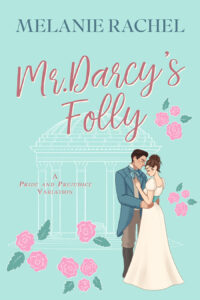Writing Mr. Darcy: Power, Privilege, and the Perils of Being the Youngest
So, here’s the thing. I love writing different versions of Fitzwilliam Darcy—how could I not? He’s intelligent, rich, honorable, and once he learns his lesson, romantic. But writing a compelling Darcy in Pride and Prejudice variations (whether canon-compliant, alternate universe, or romantic comedy) requires more than giving him a large estate and a dry wit. Writing Darcy can be tricky, because his character must balance the public man—wealthy, titled, and powerful—with the private one: young, emotionally underdeveloped, and often isolated.
In Mr. Darcy’s Folly, I lean a bit into a lesser-explored dynamic—what it means for Darcy to be the youngest male in his extended family, despite being the master of Pemberley. Let’s dig into what that means.
The Public Mr. Darcy: Wealthy, Competent, Respected
Darcy is rich. In Regency terms, filthy rich. His ten-thousand-a-year places him in the top tier of the landed gentry. He is the master of a great estate, the guardian of his younger sister, and the central decision-maker for an entire community of tenants, servants, and dependents.
So yes, he should be competent. He must be decisive. And if I’m writing a story set post-canon or after he’s had some growth, he can also be mature, emotionally intelligent, and confident in his values.
But.
He’s only twenty-eight by the end of the novel, which means he’s likely just twenty-seven when he first meets Elizabeth. That’s still quite young, particularly in a society where men were often raised in emotionally distant, highly formal households. He may come across as overconfident—Elizabeth certainly sees him that way—but his upbringing might make him wish for a warmer relationship with his wife, a desire that makes him vulnerable. And Elizabeth’s rejection at the parsonage clearly forces him to reassess his behavior, because when he next appears in the story at Pemberley, he’s a changed man, one who seems to have taken (most) of Elizabeth’s criticisms to heart.
Darcy Isn’t Always Home
Many variations treat Pemberley like Darcy’s constant sanctuary, (and that’s okay) but it’s more accurate to canon that a man of his position would split his time. The social scene in town, house parties thrown by friends (which often lasted for weeks), and other family obligations would naturally draw him away.
According to Mrs. Reynolds, Darcy is only at Pemberley part of the year, and that matters to my basic understanding of the character.
He’s in charge—but not always present. I try to think about that when I’m writing him, because that duality can create both narrative tension and emotional frustration. Maybe he worries he’s not doing enough. Maybe he hates that others think they know his estate better than he does. Maybe the land and the people feel more like responsibility than home. Or maybe he just wishes his father was still alive so he could spend more time doing what most young men his age did when they had wealthy families. Instead, he’s managing a large estate and serving as guardian to a younger sister.
The Youngest Male
As far as we know from Austen’s novel, Darcy is the youngest male in a powerful extended family. Yes, he’s master of Pemberley—but around his family, he’s still “the boy.” The one whose mistakes are remembered (and in Mr. Darcy’s Folly he confesses several of them to Elizabeth, one of which involves some nasty geese). He’s the one who is told he worries too much, he doesn’t know what he’s talking about, he is too stubborn for his own good.
Folly’s Darcy is capable, but not always confident.
And that makes him grouchy. Not aloof. Not mysterious. Grouchy. He enters the story in a mood, and really, who can blame him?
Final Thoughts
For me, writing Darcy isn’t about stripping him of his dignity or romantic appeal, it’s not about making him different unless there are different circumstances that explain it. Instead, it’s about building a bridge between the man the world sees and the man he could become. I think that when the burdens of youth, family dynamics, and fractured self-assurance beneath that wealthy, buttoned-up surface are taken into account, I can at least attempt to create a version of Darcy who feels real, even to today’s readers.
Want to read Mr. Darcy’s Folly? It’s available here: https://readerlinks.com/l/4670681

5 comments
Skip to comment form
I bought it on Amazon and started it last night. Awesome so far. I learned about chalk mines because of you.
One version of Darcy that I’ve read and isn’t as workable for me is when the author so exaggerates his arrogance and pride in his name and heritage that I don’t want Elizabeth to fall in love with him, nor do I believe his love for her.
That was a great analysis of Darcy’s character, very intelligently written. I did something with Darcy’s Folly that I’ve never done before, after reading over 1100 JAFF and Regency fiction ebooks. I finished the book and went right back to the beginning and read it again. It’a an all-time favorite for me.
I’m reading this now.
Your profound understanding of Darcy’s character is probably one of the reasons I like your writing so much.
I can’t stand it, if he’s too arrogant to be likeable, but for me it’s even worse when he’s too weak and too vulnerable or his pining for Elizabeth is completely overdone.
To me, the right balance of these traits is what makes him feel real and relatable.
Love your analysis of Darcy’s character & circumstances. Very insightful.